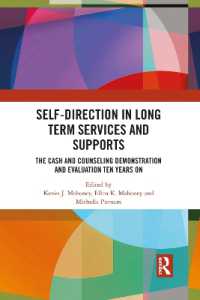- ホーム
- > 洋書
- > 英文書
- > History / World
Full Description
The skeptic Pierre-Daniel Huet's Censura philosophiae cartesianae (1689) is the most comprehensive, unrelenting and devastating critique of Descartes ever. It incisively captures all the issues that now interest readers of Descartes: the method of doubt, the cogito, clarity and distinctness as criteria of truth, the circularity of the Meditations, proofs of God's existence, etc. Naturally, the work provoked great controversy among the Cartesians, who were implicated in various capacities—Nicolas Malebranche as the occasional cause of the publication, and Pierre-Sylvain Regis as the chief defender of the Cartesian camp. What emerges in this study of the controversy is a heroic, defensible Descartes. He possesses hitherto unappreciated answers to the criticisms that have bedeviled his philosophy from his time to ours.
Contents
Foreword
Abbreviations
I. People
1. Who was Huet?
2. The Censura: When and Why?
3. The Birth of Skepticism
4. Malebranche's Surprising Silence
5. The Downfall of Cartesianism
II. Kinds
6. Huet a Cartesian?
7. Descartes and Skepticism: The Standard Interpretation
8. Descartes and Skepticism: The Texts
III. Thoughts
9. The Cogito: An Inference?
10. The Transparency of Mind
11. The Cogito as Pragmatic Tautology
IV. Doubts
12. The Reality of Doubt
13. The Generation of Doubt
14. The Response to Doubt
V. Rules
15. The Criterion of Truth
16. The Trump Argument
VI. Circles
17. The Simple Circularity of the Meditations
18. The Inner Circle(s)
VII. Gods
19. Gassendist Influences
20. The Objection of Objections
21. The Rejection of Intentionality
VIII. Virtues
22. Descartes's Voice
23. Betting the Family Farm
24. The Propagation of Light
25. The Heart-Beat
26. The Moving Earth
27. Faith and Reason
28. Descartes as Methodological Academic Skeptic
Bibliography of Works Cited
Index








